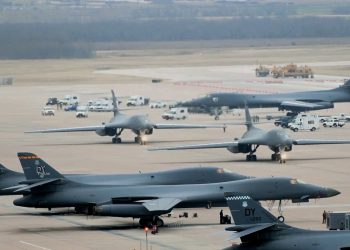US Air Force,
RANDOLPH AIR FORCE BASE, Texas: The Air Force chief of staff called the buildup of the unmanned aircraft system program “profoundly important” Feb. 19 during a visit with instructor and student aviators here.
In remarks during a question and answer session with 12th Operations Group instructors, students and staff, Gen. Norton Schwartz said UAS capabilities play an important role in joint operations at a critical juncture in Air Force history.
“This is one of those inflection points, one of those times when the whole path of history shifts,” General Schwartz said. “That's what's happening, and the question is whether the United States Air Force wants to be on that wave or left behind.”
As Air Force leaders build their roadmap for the future of UAS operations, the highest-ranking Airman told the group of about 50 aviators that UAS support of ground forces has never been more important.
“We've got eyes 24/7 on bad guys,” he said of UAS capabilities. “We're at the point now where (ground forces) say, 'I'm not going in that door or turning that corner if I don't have my top cover.'
“That is the reality,” he added. “That's how important what we're doing has become, and I think this is going to continue.”
The ability to field more UAS platforms depends on having a cadre of qualified operators. The first step toward that qualification takes place here at the 563rd Flying Training Squadron in a UAS Fundamentals Course launched in November.
The four-week course provides student aviators the tactical foundation of UAS platforms and weapons employment before they head to Creech Air Force Base, Nev., and eventually train with actual UA systems. Randolph AFB is the temporary home for the course, which eventually will be housed at Holloman AFB, N.M.
While technology allows Air Force warfighters to do things that were not possible before, General Schwartz said “the truth of the matter is what we're able to do (with UAS platforms) is a better approach to making sure the joint team can succeed and accomplish the missions we've been assigned.”
In reference to the issue of people in favor of manned versus unmanned aircraft operations, the chief of staff put the debate into perspective.
“The question is, 'Is this about personal satisfaction or about contribution?' Your Air Force is about contribution, not attribution,” he said.
That's not to say the general foresees a future without manned aircraft.
“There will always be a need for manned aviation, but it will be a lesser proportion of the fleet than is currently the case,” he said.
The new generation of aviators who will operate unmanned aircraft may not have the in-cockpit skills of the pilots who fly manned aircraft, the general said, but they will have the smarts and multi-tasking capabilities to maximize UAS effectiveness.
“They will know about airspace, they will know about air-to-ground coordination, they will know the difference between hostile and non-hostile (threats), and they will be able to do things our generation never could think of,” General Schwartz said. “I'm convinced that this part of our force mix will be vitally important as we go down the road. The people who operate unmanned systems will have a place in our Air Force as far as the eye can see.”
The current Air Force fleet of UAS platforms consists of the MQ-1 Predator, MQ-9 Reaper and RQ-4 Global Hawk.








